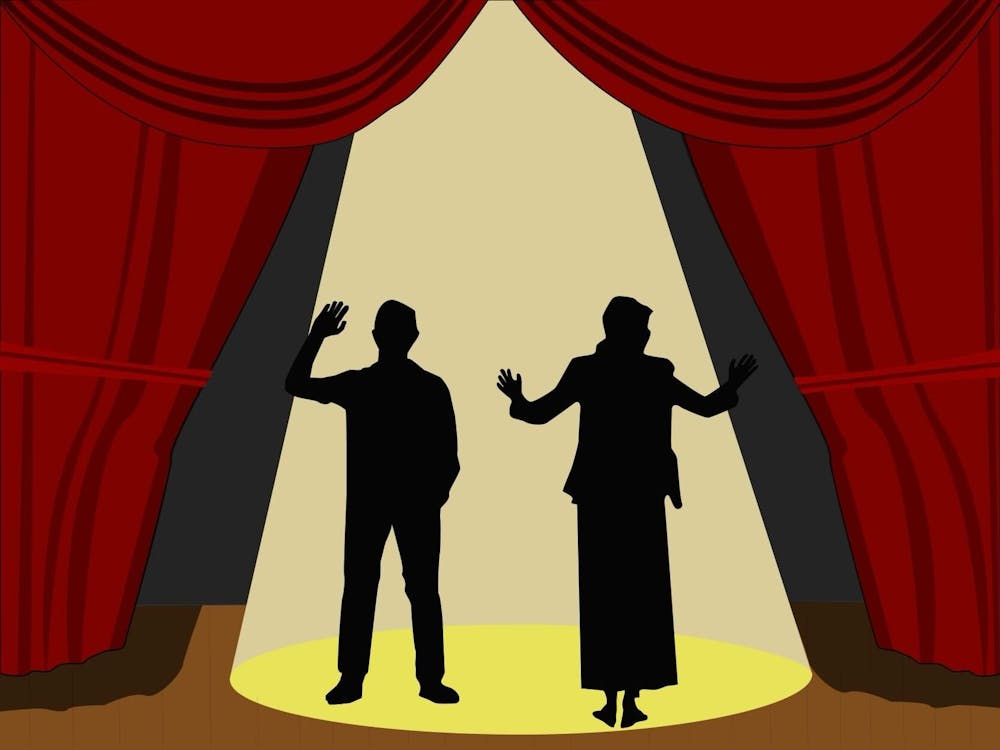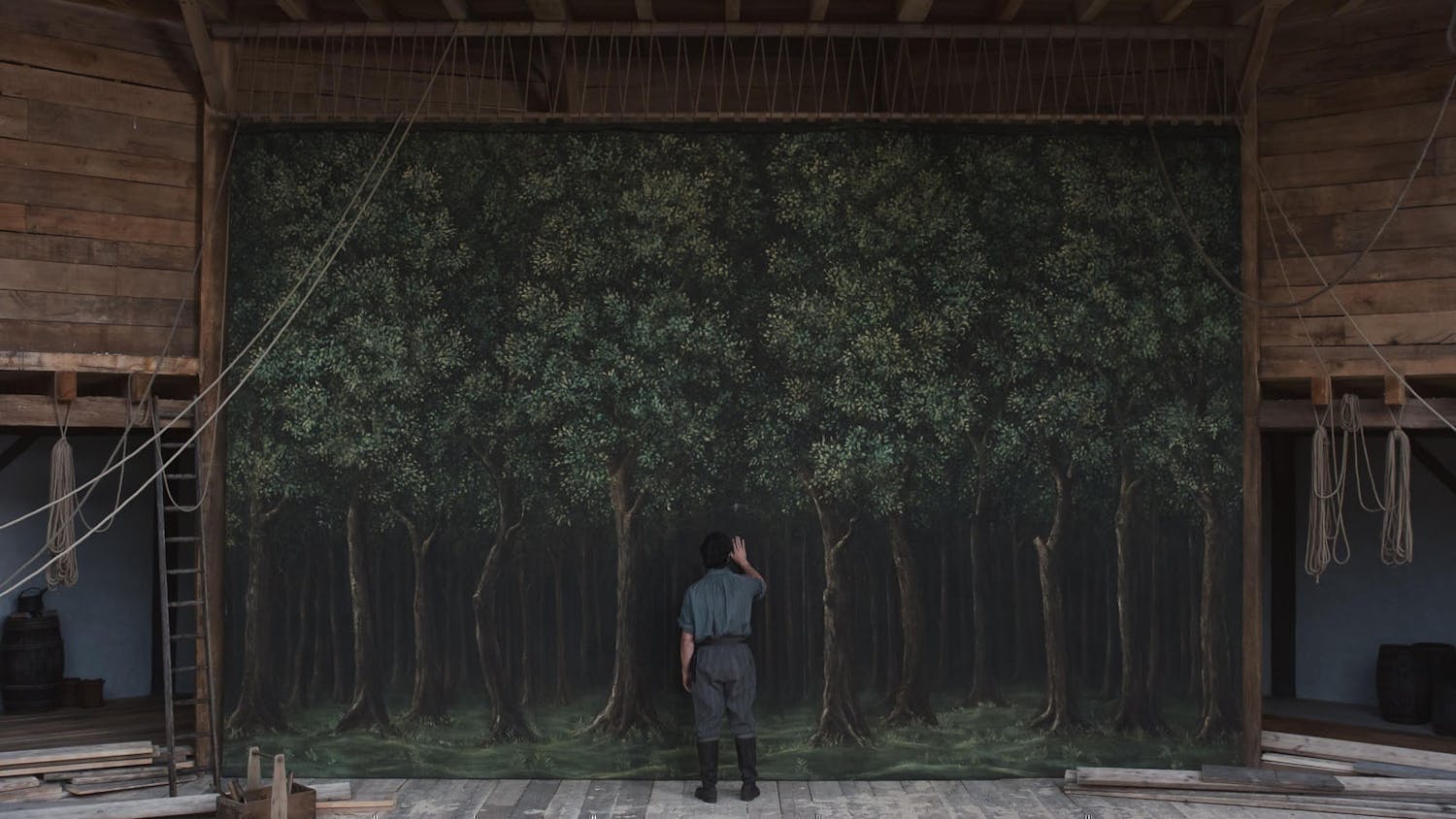Editor’s Note: This story is the first of a two part series.
When Jae Gee, a senior in American University’s Department of Performing Arts, read a number of statements on social media from a “Bat Boy” castmate and former AU student, she was disheartened.
The student made posts to her Instagram story at the beginning of tech rehearsal week for the DPA’s spring 2023 adaptation of “Bat Boy: The Musical,” which included the statement, “[AUx2] is literally racist towards non-Black people…” The castmate also posted a screenshot of a text conversation she had with her family during an AUx2 class in which she wrote “everyone is gay and autistic,” and that “as a straight white girl … I have struggles as well” but is “made to look like the devil.” Gee, who identifies as half-Chinese, said that the castmate then made in-person comments to her that ranged from “deeply insensitive” to “outright racist.”
The Eagle reached out to the student to respond to the allegations. The student said that she would “consider for sure.” After The Eagle requested a response a second time, she said “I have no comment on the situation … I have been advised not to comment.”
Feeling uncomfortable in the production space, Gee informed assistant managers, who reported the situation to DPA Chair Daniel Abraham and then-Director of the Theatre & Musical Theatre Program Karl Kippola. Kippola called a mandatory full cast, crew and staff meeting with Nuria Vilanova, the College of Arts and Science’s diversity, equity and inclusion officer. Vilanova also leads the CAS Diversity Committee.
At this meeting, students were informed that the castmate who made the comments would not be removed from the show, in part because participation was for academic credit. Despite not being able to remove the castmate from the show, the stage managers and director re-blocked scenes to keep her as distanced as possible from Gee, and Vilanova held a mediation between Gee and the castmate to try and resolve the issue.
Gee said she was extremely frustrated with what she felt was a “tone-deaf response,” because the comments and posts made were not isolated to a relationship between the two of them, but impacted other people in the cast.
“I was promised that they were going to look at reorganizing certain policies so that if anything like this ever happened again, they could deal with it more effectively,” Gee said. “They promised me they would keep me in the loop, but they have not, which is disappointing.”
In the world of theater, actors collaborate with each other, directors, costume designers and many additional workers to put on a successful production. People of color in theater have said they often find themselves in predominantly white spaces working against a tradition of racism. The Eagle spoke with 12 students of color who shared their experiences with varying levels of ignorance and racism in AU’s Theatre Program.
Aisley Wallace Harper, a cast member in “Bat Boy” and an AU alumna, said the Department needs to have a way to remove cast members who are being “racist, bigoted or hateful” from a production. She also said not removing the cast member may have been received better if the Theatre Program had come into the meeting with other solutions for keeping the cast safe.
Following the closing of “Bat Boy” the Department set up an anonymous reporting form on their website home page as a commitment to ensuring students have a mechanism to report concerns. Abraham said he wanted to make sure Theatre students and the AU community as a whole could make a report safely without identification.
Student issues within the Theatre & Musical Theatre Program
Discrimination in theater can take on various forms which perpetuate existing inequalities and hinder diversity efforts. These actions can include stereotyping actors and limiting opportunities for actors of color. Gender-based discrimination is also very prevalent, with women often underrepresented in leadership positions such as director or producer.
Claire Phillips, a junior in the School of Public Affairs with a minor in Theatre, said that she had witnessed “a clear example of hair discrimination” while working as a costume designer for “Bat Boy.” Phillips said one Black cast member was asked to change the look of his hair for a role, despite other cast members saying that his hair did not need to be changed. Phillips said the Department had no products that worked on ‘4C’ hair, so she had to bring in her own personal products for the student to use.
“I don’t think it is purposeful but I think people are used to having an all-white base that is not accommodating at all … Theater is inherently dominated by white people and created for white people, so there are kind of white supremacist undertones,” Phillips said. “I feel sad that students get to a point where they feel like they have to drop their minor or don’t want to be associated [with the program.]”
Sydne Chesson, an AU alumna who graduated with a Theatre minor, said many of her friends have struggled with being typecast or stereotyped for certain roles, so having non-biased casting of students of color in the Theatre Program is necessary for anti-racist theater. Phillips also said that she thinks “favoritism” is apparent when casting people for roles.
Carson Young, a senior in the Theatre Program, said that “AU’s casting process for shows is talent-based” and that his peers in the program did work to get roles. Still, Young said he understood other students of color who may feel they aren’t being cast because of their looks and are uncomfortable with the casting process as a whole.
Microaggressions are subtle, often unintentional acts that convey offensive and harmful messages toward individuals or groups about characteristics such as race and ethnicity. Microaggressions, especially in theater, can inadvertently foster an unwelcoming environment.
Simon Huynh, a junior in the Theatre Program, said “most of my friends in the [Program] are white so there is sort of a culture of not talking about experiences” or microaggressions that occur unless it is with other students of color.
“From the top, I feel the DPA is so white that it’s hard for white people in the DPA to see that there is a dearth of POC representation and that it is a big problem,” Huynh said. “If you pretend that you’re not the only POC and you ignore the fact that most of the people are white in class, in terms of curriculum, things are fun.”
Sarina Govindaiah, a junior in the School of International Service, was an assistant stage manager for “Bat Boy.” She said that even though AU is a predominantly white institution, she has been able to “avoid racist spaces” in the Theatre Program. Govindaiah said that with a small POC population, this is a balancing act between being inclusive and having realistic expectations.
“AU doesn’t do diverse shows because we don’t have the ability to do diverse shows,” Govindaiah said. “I think attempting to do something that you can do successfully, sticking an all-white cast in a historically white production and then including people of color, is better than attempting to do a show like ‘In the Heights,’ which you very clearly don’t have the diversity for.”
One incident involving Kippola stood out for students as particularly upsetting. Kippola called an optional meeting for the entire Theatre Program on March 6 to announce the shows for the upcoming production season. The meeting was pitched to students as a place to brainstorm improvements they would like to see within the Department.
Hannah DiGiovanni, a junior majoring in Theatre, said that the meeting’s positive intention was quickly overshadowed.
“While trying to explain something about community, Karl said ‘This doesn’t sound good coming from me, so just imagine I'm a big, tall, gay, Black man,’” DiGiovanni said. She added that she believed the comment was offensive to Black people and POC in the Department.
“For the few students that do sort of replicate that behavior, it also shows them that they can do what they want and get away with it,” DiGiovanni said.
Wallace Harper said she didn’t think Kippola’s intentions with the comment were bad, but that it was still a moment where Black students and POC “connected eyes around the room.”
Lauren Riojas, a Theatre alumna, said she felt “put off” by the comment and thought it was both uncalled for and offensive.
In an interview with The Eagle, Kippola said that he was referring to an artist who is in a diversity and inclusion administrative position for a professional theater in D.C.
“I was making fun of myself in terms of my failings and in terms of my speaking about diversity from a position of power and privilege, but also in terms of my ability to speak as eloquently and persuasive[ly],” Kippola said. “So, it was an attempt at humor that was probably unwise. If I was living my life over again, I probably wouldn't have said it, but that’s been true about many of the attempts at humor I’ve done in the past.”
In an email to The Eagle on Sept. 11, Kippola said that he will be on a research sabbatical until January 2024, and wrote “this year seemed a good time to hand the [director] position” to Jason Arnold, a professorial lecturer in the DPA.
The Theatre Program’s diversity efforts
Kippola said that one of the Theatre Program’s focuses is to increase diversity among students and faculty. He said that the DPA tries to bring in a lot more female guest directors, designers and choreographers. Kippola added that when looking for Theatre Program faculty to hire, he reached out to organizations that serve theater artists of color, women and non-binary people.
“This has given students exposure not only to a range of perspectives but also connections to the professional world,” Kippola said. “These guests we are bringing in, I think, are helping students understand — especially our students of color — how exciting the state of professional theater is in D.C. and how to understand or navigate that world.”
The Department of Performing Arts also added a certificate called “Social Action, Justice, and the Performing Arts” this summer, for students who are interested in learning about how to use acting for social change.
Kippola said that the Theatre Program has been undergoing a multi-year process of curriculum revision, intended to improve inclusivity. He explained that the plan is to have two semester-long courses in theater history and drama of the global majority, which would focus on works written by African, Asian and Latino diasporic artists.
“We have had talks as a faculty about working to bring more diversity in the plays and musicals we are teaching and studying,” Kippola said. “We want to work on communicating more individually with students about what aspects of their identity they want to be able to connect to in the works that are being selected in class.”
Editor’s Note: The Eagle chose not to name the former University student who is accused of racism in consultation with its Ethics Code to minimize harm and to keep the story’s focus on the larger issue at hand. This student is not a confidential source, which would require a higher standard for anonymity to be granted from editors. The student did not request to not be named, but Eagle editors made this decision by weighing the potential harm to the student and the benefits of naming them in collaboration with the story’s writer. This story focuses on larger structural issues students found in the DPA, and not the behavior of one individual student. The Eagle’s Ethics Code was developed with the Society of Professional Journalists' Code of Ethics.
This article was edited by Sara Winick, Tyler Davis, Walker Whalen, Zoe Bell, Jordan Young and Abigail Pritchard. Copy editing done by Isabelle Kravis and Sarah Clayton.





